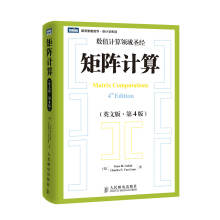矩阵计算(英文版·第4版)
作者:[美] Gene,H.Golub Charles,F.Van,Loan 著
出版:人民邮电出版社 丛书:图灵原版数学·统计学系列
页数:756
定价:99.00 元
ISBN-10:7115346100
ISBN-13:9787115346100
去豆瓣看看 1 Matrix Multiplication
1.1 Basic Algorithms and Notation
1.2 Structure and Efficiency
1.3 Block Matrices and Algorithms
1.4 Fast Matrix-Vector Products
1.5 Vectorization and Locality
1.6 Parallel Matrix Multiplication
2 Matrix Analysis
2.1 Basic Ideas from Linear Algebra
2.2 Vector Norms
2.3 Matrix Norms
2.4 The Singular Value Decomposition
2.5 Subspace Metrics
2.6 The Sensitivity of Square Systems
2.7 Finite Precision Matrix Computations
3 General Linear Systems
3.1 Triangular Systems
3.2 The LU Factorization
3.3 Roundoff Error in Gaussian Elimination
3.4 Pivoting
3.5 Improving and Estimating Accuracy
3.6 Parallel LU
4 Special Linear Systems
4.1 Diagonal Dominance and Symmetry
4.2 Positive Definite Systems
4.3 Banded Systems
4.4 Symmetric Indefinite Systems
4.5 Block Tridiagonal Systems
4.6 Vandermonde Systems
4.7 Classical Methods for Toeplitz Systems
4.8 Circulant and Discrete Poisson Systems
5 Orthogonalization and Least Squares
5.1 Householder and Givens Transformations
5.2 The QR Factorization
5.3 The Full-Rank Least Squares Problem
5.4 Other Orthogonal Factorizations
5.5 The Rank-Deficient Least Squares Problem
5.6 Square and Underdetermined Systems
6 Modified Least Squares Problems and Methods
6.1 Weighting and Regularization
6.2 Constrained Least Squares
6.3 Total Least Squares
6.4 Subspace Computations with the SVD
6.5 Updating Matrix Factorizations
7 Unsymmetric Eigenvalue Problems
7.1 Properties and Decompositions
7.2 Perturbation Theory
7.3 Power Iterations
7.4 The Hessenberg and Real Schur Forms
7.5 The Practical QR Algorithm
7.6 Invariant Subspace Computations
7.7 The Generalized Eigenvalue Problem
7.8 Hamiltonian and Product Eigenvalue Problems
7.9 Pseudospectra
8 Symmetric Eigenvalue Problems
8.1 Properties and Decompositions
8.2 Power Iterations
8.3 The Symmetric QR Algorithm
8.4 More Methods for Tridiagonal Problems
8.5 Jacobi Methods
8.6 Computing the SVD
8.7 Generalized Eigenvalue Problems with Symmetry
9 Functions of Matrices
9.1 Eigenvalue Methods
9.2 Approximation Methods
9.3 The Matrix Exponential
9.4 The Sign, Square Root, and Log of a Matrix
10 Large Sparse Eigenvalue Problems
10.1 The Symmetric Lanczos Process
10.2 Lanczos, Quadrature, and Approximation
10.3 Practical Lanczos Procedures
10.4 Large Sparse SVD Frameworks
10.5 Krylov Methods for Unsymmetric Problems
10.6 Jacobi-Davidson and Related Methods
11 Large Sparse Linear System Problems
11.1 Direct Methods
11.2 The Classical Iterations
11.3 The Conjugate Gradient Method
11.4 Other Krylov Methods
11.5 Preconditioning
11.6 The Multigrid Framework
12 Special Topics
12.1 Linear Systems with Displacement Structure
12.2 Structured-Rank Problems
12.3 Kronecker Product Computations
12.4 Tensor Unfoldings and Contractions
12.5 Tensor Decompositions and Iterations
Index
Gene H. Golub(1932-2007), 美国科学院、工程院和艺术科学院院士,世界著名数值分析专家,现代矩阵计算奠基人,矩阵分解算法的主要贡献者。生前曾任斯坦福大学教授。
Charles F. Van Loan,著名数值分析专家,美国康奈尔大学教授,曾任该校计算机科学系主任。他于1973年在密歇根大学获得博士学位,师从Cleve Moler。
《图灵原版数学·统计学系列:矩阵计算(英文版·第4版)》是数值计算领域的名著,系统介绍了矩阵计算的基本理论和方法。内容包括:矩阵乘法、矩阵分析、线性方程组、正交化和小二乘法、特征值问题、Lanczos 方法、矩阵函数及专题讨论等。书中的许多算法都有现成的软件包实现,每节后附有习题,并有注释和大量参考文献。新版增加约四分之一内容,反映了近年来矩阵计算领域的飞速发展。
《图灵原版数学·统计学系列:矩阵计算(英文版·第4版)》可作为高等院校数学系高年级本科生和研究生教材,亦可作为计算数学和工程技术人员参考书。









 缺书网
缺书网 扫码进群
扫码进群